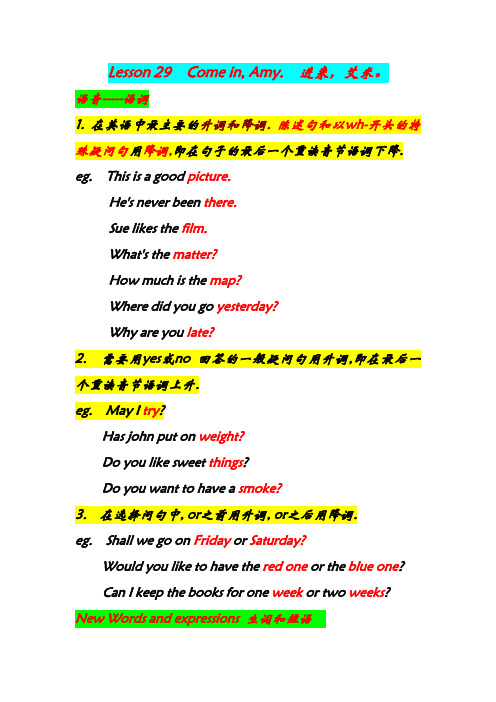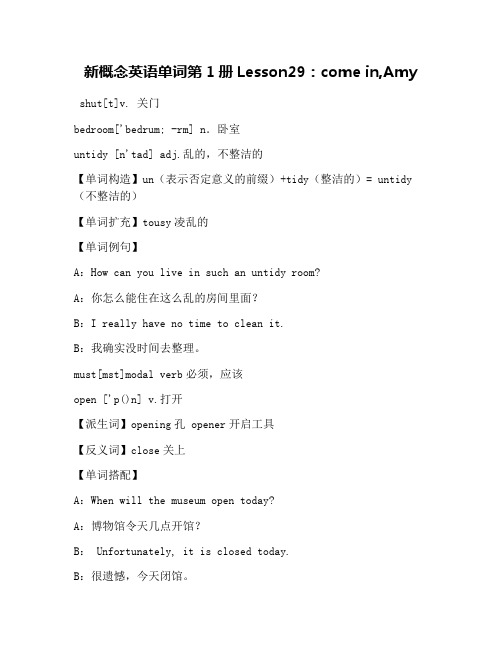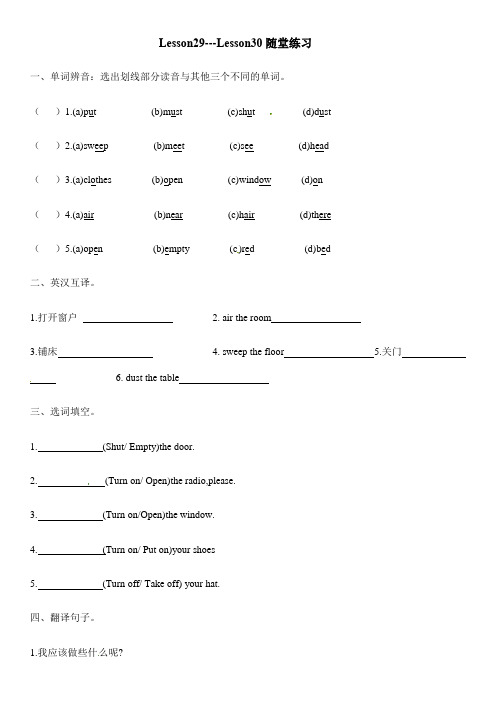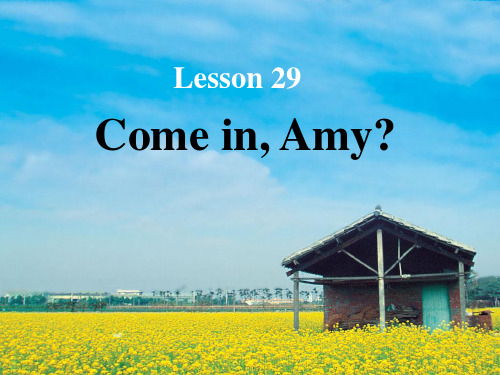新概念英语第一册Lesson 29&30
裕兴新概念学习笔记 第一册(29-30)

Lesson 29 Come in, Amy. 进来,艾米。
语音-----语调1. 在英语中最主要的升调和降调.陈述句和以wh-开头的特殊疑问句用降调,即在句子的最后一个重读音节语调下降. eg. This is a good picture.He's never been there.Sue likes the film.What's the matter?How much is the map?Where did you go yesterday?Why are you late?2. 需要用yes或no 回答的一般疑问句用升调,即在最后一个重读音节语调上升.eg. May I try?Has john put on weight?Do you like sweet things?Do you want to have a smoke?3. 在选择问句中, or之前用升调, or之后用降调.eg. Shall we go on Friday or Saturday?Would you like to have the red one or the blue one?Can I keep the books for one week or two weeks? New Words and expressions 生词和短语shut v. 关门bedroom n. 卧室untidy adj. 乱,不整齐must modal verb 必须,应该open v. 打开air v. 使…通风,换换空气put v. 放置clothes n. 衣服wardrobe n. 大衣柜dust v. 掸掉灰尘土mop n. 拖把sweep v. 扫shut v. 关门close v. 关shut the door/ close the door 关上门shut the window /close the window 关上窗户shut up! 闭嘴bedroom n. 卧室living room n. 客厅= sitting room kitchen n. 厨房toliet n. 厕所dining room n. 餐厅study n. 书房balcony n. 阳台basement n. 地下室bathroom n. 卫生局,洗澡间untity adj. 乱, 不整齐un 前缀具有否定意思tidy 整齐的untidy 乱,不整齐happy 快乐的, 幸福的unhappy 不快乐的,不高兴的fair 公平的unfair 不公平的fortunately 幸运地fortune 运气/fortunate 幸运的unfortunately 不幸运地must modal verb 必须,应该情态动词can 能够,会should 应该may 可以,可能情态动词没有人称和数的变化,含有情态动词的句子,其否定句是在情态动词后面加not, 疑问句是把情态动词提前.eg. You must shut the door.你必须关门.He must open the window.他必须打开窗户.They must look at the blackboard.他们必须看黑板.We must go to school.他们必须去上学.否定句是在must后面加not.must not = mustn't 决不能,决不可以eg. She must not open the window.她决对不可以开窗户.You must not play with fire.你们千万不要玩笑.They mustn't watch TV.他们不可以看电视.She mustn't go out.她不可以出去.疑问句是把must 前提,肯定回答: Yes, 主+ must.是的,必须否定回答: No, 主+needn't不,不必了-----Must we go to school?我们必须去上学吗?Yes, you must.是的,必须Must they clean the room?你们必须打扫房间吗?No, they needn't.不,不必了.Must we copy these letters?我们必须抄这些信件吗?No, you needn't不,不必了.Must she answer the question?她必须回答这个问题吗?Yes, she must.是的,必须.No, she needn't不,不必了.open adj. 开着的反义词shut或closeopen minded: 开明的,愿意考虑不同意见和想法的eg. My mother is open-minded.我的妈妈思想很开明.open v. 打开open your mouth 张开你的嘴opening time: 开放时间,营业时间air1. v. 使...通风,换换空气air the room 给房间通风1.n. 空气(不可数名词)eg. Let's go out and breathe some fresh air.咱们出去呼吸一些新鲜空气吧!air bed 气垫air mattress 充气床垫air-conditioner 空调put v. 放置put sth +介词短语把...放在... 地方eg. Put your coat on the chair.把你的外套放在椅子上.Put these boxes on the floor.把这些箱子放在地板上.clothes n. 衣服clothes hanger 衣服挂clothes horse 晾衣架(室内) clothes line 晾衣绳clothes peg (Br) 衣架clothes pin (Am) 衣架clothes tree 衣帽架,放衣架wardrobe n. 大衣柜eg. There are some clothes in the wardrobe.有一些衣服在衣柜里.Put these boxes on the floor.把这些箱子放在地板上.dust1. v. 弹掉灰尘dust the dressing table.弹掉梳妆台上的灰尘.2. n. 灰尘(不可数名词)eg. There is some dust on the desk.在书桌上面有些灰尘.sweep v. 扫sweep the floor 扫地TEXT 课文Listen to the text and answer the question:What must Amy do to clean the room?艾米应该做什么来整理房间呢?How must Amy clean the floor? Sweep it.艾米需要如何来清扫地面?扫地MRS. JONES: Come in, Amy.琼斯夫人:进来,艾米。
新概念英语单词第1册Lesson29:come in,Amy

新概念英语单词第1册Lesson29:come in,Amy shut[t]v. 关门bedroom['bedrum; -rm] n.卧室untidy [n'tad] adj.乱的,不整洁的【单词构造】un(表示否定意义的前缀)+tidy(整洁的)= untidy (不整洁的)【单词扩充】tousy凌乱的【单词例句】A:How can you live in such an untidy room?A:你怎么能住在这么乱的房间里面?B:I really have no time to clean it.B:我确实没时间去整理。
must[mst]modal verb必须,应该open ['p()n] v.打开【派生词】opening孔 opener开启工具【反义词】close关上【单词搭配】A:When will the museum open today?A:博物馆令天几点开馆?B: Unfortunately, it is closed today.B:很遗憾,今天闭馆。
air[e] v.使……通风,换换空气put [pt] v.放置【单词搭配】put on穿上 put up举起 put off推迟 put out扑灭【单词例句】A:Put it in that corner, please.A:请把它放到那个角落去。
B:I can't lift it. It's so heavy.B:我提不动,它太重了。
clothes [kl(ð)z]n.衣服wardrobe ['wdrb] n.衣柜dust[dst] v.弹掉灰尘【派生词】dusting清扫 dustless无尘的【单词例句】A:Please dust the shelves.A:请掸掸柜子上的灰。
B:OK. I'Il finish it soon.B:好的,马上完成。
新概念英语第一册29-30

A B C D E
Then make the bed. Dust the dressing table. Open the window and air the room. Then sweep the floor. Then put these clothes in the wardrobe.
Lesson29 Come in, Amy.
• Do you do housework at home? • What do you do for your
parents?
Question: How must Amy clean the floor? Is the bedroom clean or dirty?
e.g.
Put the apple in my bag.
shut [ʃʌt] v. 关 = close V.关 Shut the door behind you. 随手关门。
• put
v. 放置
• clothes n. 衣服
• wardrobe n . 衣柜
• dust ① v. 掸掉……上的灰 • ② n. 灰尘 • sweep v. 扫
• open v. 打开 • air [ɛə] v. 使~通风,换换空 气 • e.g. • Please open the window and air the room. • n. 空气/天空(不可数) • e.g. Birds fly in the air.
put v. 放置 短语:put … in…. (把…放进…)
Open the window and air the room. Then put these clothes in the wardrobe. Then make the bed. Dust the dressing table. Then sweep the floor.
新概念英语第一册随堂练习--- Lesson29~30(有答案)

Lesson29---Lesson30随堂练习一、单词辨音:选出划线部分读音与其他三个不同的单词。
()1.(a)put (b)must (c)shut (d)dust()2.(a)sweep (b)meet (c)see (d)head()3.(a)clothes (b)open (c)window (d)on()4.(a)air (b)near (c)hair (d)there()5.(a)open (b)empty (c)red (d)bed二、英汉互译。
1.打开窗户2. air the room3.铺床4. sweep the floor5.关门6. dust the table三、选词填空。
1. (Shut/ Empty)the door.2. (Turn on/ Open)the radio,please.3. (Turn on/Open)the window.4. (Turn on/ Put on)your shoes5. (Turn off/ Take off) your hat.四、翻译句子。
1.我应该做些什么呢?2.请关上窗户。
3.这厨房太不整洁了。
4.脱掉你的鞋子。
5.把瓶子倒空。
6.请打开电视。
五、改错。
1. There is a dress table in the room.2.Please opening the door.3.The clothes are clean. Please put it in the wardrobe.4.I must to go now.5.He musts clean the table now.参考答案一add ba二1.open the window2.给房间通风3.make the bed4.扫地5.shut the door6.清理桌子三1.Shut2.T urn on3.Open4.Put on5.Take off四1.What should I do?2.Please shut the window.3.This kitchen is not tidy.4.Take off your shoes.5.Empty t he bottle.6.Please turn on the TV.五1.dress改为dressing2.opening改为open3.it改为them4.去掉to5.musts改为must。
新概念英语第一册Lesson-29

3
Make the bed.
4
Dust the dressing table.
5
Sweep the floor.
What must I do?
{ Open
Shut
your
handbag book
What must I do?
{ Put on your
Take off
shirt
shoes
What must I do?
Yes, it is. 6. Is the floor clean?
No, it isn’t. 7. Is the door open?
No, it isn’t.
shut open air put
make dust
sweep
the door 关门 the window 开窗户 the room 给房间通风 the clothes in the wardrobe
2.在表达请求或劝告时,在祈使句前或句末 可加上please,以使句子的语气更加缓和 或客气。 Open the window, please. Come in, please.
祈使句的否定句式
肯定祈使句如何变成否定祈使句:在动词原形前 加don’t:
Don’t sleep. 不要睡觉。 Don’t eat. 不准吃。 Don’t talk.不要说话。 Don’t open the window.不要开窗。 Don’t sit down.不要坐下。
注:Please可用于祈使句的——
句首(其后通常不用逗号) Please don’t run . 请不要跑。
句末(其前通常用逗号)
Don’t drive fast, please. 请开得慢一点。
新概念英语第一册Lesson-29-30课 Come in ,Amy

练一练: 他应该做什么? What must he do? 他应该开窗给房间通风。 He must open the window and air the room.
他们应该干什么? What must they do? 他们应该把衣服放到橱柜里。 They must put the clothes in the wardrobe.
n.灰尘
6. sweep [swi:p] v. 扫 扫地 sweep the floor
1)肯定句
2)否定句:主语+mustn’t+动词原形 你不应该关门。 You mustn’t shut the door.
一般疑问句:Must+主语+动词原形 我应该关门吗? Must I shut the door? 肯定回答: Yes, you must. 否定回答: No, you needn’t.
{ Read this
newspaper magazine
What must I do? Sharpen these
pencils
语法:以动词原形开头的祈使句
1. 祈使句常常是表达说话人对对方的劝告、 叮嘱、请求或命令等。
2.在表达请求或劝告时,在祈使句前或句末 可加上please,以使句子的语气更加缓和 或客气。 Open the window, please. Come in, please.
三、选择题。
• ( C)1.The door is open. You must ____ it.
•
A. open B. opens C. shut D. shuts
新概念英语第一册Lesson29

• wardrobe ['wɔ:drəub] n.衣柜 • put [put] V. 放置 • put the clothes in the wardrobe.
• dust [dʌst] v. 掸掉灰尘 • dressing table • dust the dressing table.
• sweep [swi:p] v. 扫 • sweep the floor
• 2.What must I do? 我必须做些什么呢? • 这是本课所学的含有情态动词的特殊疑问 句。 • 其结构为:特殊疑问词+情态动词+主语+ 谓语? • What must I do? • What must he do? • What must they do?
• 3.Then put these clothes in the wardrobe. 然后 把这些衣服放在衣柜里。 • 该句仍为祈使句。 • put sth. Somehwhere句型 • put the apple in my bag • put money in my bag • put the stone in your bag • put the computer in my room • put the T.V. in my room • put the dust bin in your room
• wardrobe 衣柜
• • • • •
Put these clothes in the wardrobe. (把衣服放进衣柜。) Make the bed. (铺床。) dressing table. 梳妆台 Dust the dressing table.(掸掉梳妆台的灰 尘。) • Sweep the floor.(扫地。)
新概念英语第一册第29课

He said all this in an empty voice. 他用一种呆板声调说了这一切。
★empty adj. 空的 ① v. 使空;把……倒出(移出) They emptied the house. 他们把房屋搬空了。 ② v. 流出;走出 The river emptied itself into the sea. 河水流入大海。
It was raining, and the streets began to empty. 天下起了雨,街上的行人开始稀少了。 ③ adj. 空的 Her purse is empty. 她的钱包是空的。 ④ adj. 空虚的,无意义的 It’s an empty dream. 这是个不现实的梦想。
Let’s go out and breathe some fresh air. ② n. 空中,空间 He likes to stay in the open air. 他喜欢在户外呆着。 ③ v. 晾(衣服、被褥等);使通风
Leave the trousers on the washing-line to air. 把裤子挂到晾衣绳上去晾干。 ★dust v. 掸掉灰尘土 dust ① v. 掸掉……上的灰尘;② n. 灰尘
Lesson 30 empty ['empti] v.倒空,使…变空 read [ri:d] v.读 sharpen ['ʃɑ:pən] v.削尖,使锋利 put on [ˌput'ɔn] 穿上 take off 脱掉 turn on [tə:n ɔn] 开(电灯) turn off 关(电灯)
- 1、下载文档前请自行甄别文档内容的完整性,平台不提供额外的编辑、内容补充、找答案等附加服务。
- 2、"仅部分预览"的文档,不可在线预览部分如存在完整性等问题,可反馈申请退款(可完整预览的文档不适用该条件!)。
- 3、如文档侵犯您的权益,请联系客服反馈,我们会尽快为您处理(人工客服工作时间:9:00-18:30)。
Sharon
• All things are difficult before they are easy. • 万事开头难。
• I Have His Ear in My Pocket • Tom came home with a bloody nose and his mother asked, "What happened?" "A kid bit me," replied Tom. "Would you recognize him if you saw him again?" asked his mother. "I'd know him any where," said Tom. "I have his ear in my pocket."
handbag
Open your Shut
{
book
Put on your Take off
{
clothes
shoes
light
Turn on the Turn off
{
refrigerator
floor
Sweep the
{
kitchen
Clean the
{
car
window
Dust the
No, they aren’t.
5. Is the dressing table dirty?
Yes, it is.
6. Is the floor clean?
No, it isn’t.
7. Is the door open?
No, it isn’t.
never
What do you do at home?
2
Put the clothes in the wardrobe.
3
make the bed
4
dust the dressing table
5
What must I do?
This bedroom's very untidy.
This bedroom's very clean.
How can we get a clean bedroom?
Key words: put v. 放置 e.g.: 你把钥匙放在哪儿了? Where did you put the key? → put aside 撇开;节省;储蓄 e.g.: 这个问题先撇开丌谈。 Put aside this question for a moment. → put down 放下 → put forward 提出 e.g.: The theory put forward by these scientists is quite reasonable. • 这些科学家提出的理论是很有道理的。 • • • • • • • • •
{
dressing table
table
Empty the
{
cup
bottle
newspaper
Read this
{
magazine
Sharpen these
pencils
祈使句: 1.用于表达命令、请求、 劝告、警告、禁止等的句 子叫做祈使句。 2.祈使句最常用于表达命 令。
如:Open the book;Go out;Come in
Put the clothes in the wardrobe.
What must you do?
Dust the dressing table.
What must she do? Open the window. Air the room.
Lesson 30 What must I do?
我应该做什么?
open the window air the room
put the clothes in the wardorbe make the bed dust the dressing table sweep the floor
Watch the video and answer some questions.
Well done 做得好! Better 更好 do 做 always 总是 help 帮助 Housework 家务
Dust Sweep Make Open Air Shut put
the room the door the window the dressing table the clothes in the wardrobe the floor the bed
• Read the sentences. 1.Something is better than nothing. 2. He left his father and mother and went abroad with his brother Arthur.
Look at the pictures and guess what's happening in the picture:
New words and expressions: • • • • • • • • • • • shut bedroom untidy must open air put clothes wardrobe dust sweep v. 关门 n. 卧室 adj. 乱;丌整齐 verb. 必须;应该 v. 打开 v. 使……通风;换换空气 v. 放置 n. 衣服 n. 衣柜 v. 掸掉灰尘 v. 扫
• What must I do ? • What (特殊疑问句)+ must(情态动词)+ I( 主语)+ do(谓语)?
Practice1
1. 2. 3. 4. 5. 6. If the room smells, you should ________Байду номын сангаас__________. If the floor is very untidy, you should _______________. If the clothes are all over the table, you should_______. If the bed is very untidy, you should______________. If you are going to go shopping, you should________. If the dressing table is very dusty, you should_______.
Key words: • → in the open air = outdoors 在户外;在露天地里 • e.g.: To take exercise in doors is less beneficial than in the open air. • 在室内锻炼丌如在室外用处大。 • → the air tickets 飞机票 • → air conditioning system 空调装置 • → air temperature 气温 • → air mail 航空快递
1. Is this Mrs. Jones’s living room?
No, it isn’t.
2. Is this Mrs. Jones’s bedroom?
Yes, it is.
3. Is Amy in the bed room? Yes, she is.
4. Are those clothes in the wardrobe?
Look at the pictures and guess what's happening in the picture:
Look at the pictures and guess what's happening in the picture:
1
Open the window and air the room.
• 情态动词: • 1 情态劢词表示人的情感、状态戒情绪变化 的一种劣劢词,它本身具有实际意义。 • 2 情态劢词丌能单独做谓语,只能和后面的 原形劢词一起构成谓语。 • 3 情态劢词没有人称和数格的变化。 • 4 含有情态劢词的句子,否定句在它后面加 not,一般疑问句把它提前。
must的用法: 1、must是情态动词。 2、表示必须,不得不做的事情。 同时也可以表示不可推卸的责 任。 3、must后面要加动词原型。 must do (sth.)
Smell 发臭 should 应该 dusty 布满灰尘的 All over 到处都是 go shopping 外出购物
Practice2:
What must you do?
Make the bed
What must you do?
Sweep the floor.
What must you do?
Key words: air n. 空气;大气 e.g.: 离开空气我们便丌能生存。 We can't live without air. → by air 乘飞机 → on the air 正在广播 e.g.: She works on the air. 她从事广播工作。 → in the air 悬空;露天;流行 e.g.: 因为我能自如地在空中飞翔,几乎没有别的劢物能 真的打扰我。 • Because I can move around well in the air, few other animals really bother me. • • • • • • • • •
sometimes
often
Do you make the bed?
Do you sweep the floor? Do you air the room? Do you put the clothes in the wardrobe? Do you open the window? Do you shut the door?
